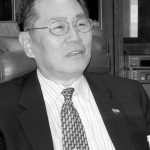Sunny K. Park is on a roll.
The Rev. James Chongho Kim may reap an additional benefit from a landmark agreement with North Korea to dismantle its nuclear weapons program.
Perhaps he won’t be that “Yankee” anymore.
“We’re sandwiched between Korea and America,” said Kim, the 48-year-old pastor of the Korean Church of Atlanta, United Methodist Church, in Duluth. “Korea is our motherland, America is our fatherland. You don’t want to see your mother and father fighting.”
Kim’s father was born in North Korea and was the only one of six siblings to escape to the South. Kim still has relatives living in the Communist North and for that reason, he wants to see peace in the region.
Like many Koreans in metro Atlanta, particularly older immigrants, Kim has followed closely the developments in Asia involving North Korea, China, Russia, Japan, South Korea and the United States.
Last week, in six-party talks in Beijing, North Korea agreed to shelve its nuclear weapons program in exchange for economic aid, enhanced diplomatic recognition, security guarantees and the possibility of receiving help to build a nuclear reactor to generate electricity.
While much of the language in the diplomatic agreement is vague, Kim has hope for the talks, which are set to resume in November.
“This very significantly eases the tension,” said Kim, who recently returned from a Methodist relief conference in both South and North Korea. “If it hadn’t gone well, it could have caused anti-Americanism to rise up.”
Most Korean Americans oppose North Korea’s Communist government but have sympathy for the people — some are distant family members separated for decades by war and geography. Perhaps no issue is greater in the Korean American community than peace, even reunification, said Han S. Park, director of the Center for the Study of Global Issues at the University of Georgia.
According to census figures, nearly 30,000 people of Korean ancestry live in metro Atlanta, although community leaders put that figure much higher.
Sang Shim, managing editor of the weekly Korean Journal in Doraville, said his office has received about 200 calls from readers.
“The Korean community is in favor of the agreement,” said Shim, who was born in Seoul, South Korea, and immigrated to the United States two years ago. “They see this as a positive step.”
Shim and others, however, warn that North Korea has promised before to abandon its nuclear program, only to restart it.
In a 1994 agreement brokered by former President Jimmy Carter, Pyongyang agreed to abandon nuclear weapons development and allow verification by inspectors from the International Atomic Energy Agency. As part of the pact, North Korea was to receive two light water nuclear reactors to produce electricity.
President Bush suspended talks with North Korea in 2001 pending a policy review. North Korea claimed the United States had not met its commitments in the 1994 agreement.
By 2002, Pyongyang had thrown out the inspectors, and U.S. officials were claiming North Korea had resumed pursuing nuclear weapons.
So it was with wariness that Shim and others watched the rhetoric coming from Pyongyang in the days after the most recent agreement.
When North Korea asked for the power plants as a first condition of the deal, many local Koreans felt justified in their skepticism about the disarmament promises.
“Most people really want to believe it, but they don’t,” said Gwinnett businessman Sunny Park, founder of the Good Neighboring Foundation Inc., which helps immigrants become a part of the American community. “North Korea has lost its credibility.”
Experts say the agreement represents a positive step but they stop short of labeling it a final pact.
The United States and other nations worry that if North Korea continues to build its nuclear program, it will further destabilize the region.
“I wasn’t excited,” said Park, who is also the founder of Uniting Families, a nonprofit group that helps to unite North Korean and South Korean families separated during the Cold War.
Park criticized the vagueness of the document but understood the reasons.
“All the parties, especially the United States and North Korea, desperately needed to go home with some accomplishment on the diplomatic front. They agreed to basically disagree and to avoid sensitive matters and postpone them for future meetings. None of the important matters were settled.”
Among the unresolved issues: how to monitor North Korea’s uranium enrichment program and when the economic aid will begin.
John E. Endicott, a professor at Georgia Tech’s Sam Nunn School of International Affairs, said the pact is “on the right track.”
“It’s going to take a lot more very serious negotiations because obviously the American side and the Korean side have very different views as to the meaning of some of the words and phases.”
While the situation remains tense, “it’s very much improved,” Endicott said.
Former U.N. Ambassador Andrew Young said he expects North Korea will be careful in its negotiations. China is applying some pressure because it wants to stabilize the region, and North Korea needs the economic aid promised in the pact.
“They will put aside some of their bluster and start acting like they have some sense,” Young said. “They’re not crazy, but they play crazy to get some attention.”



